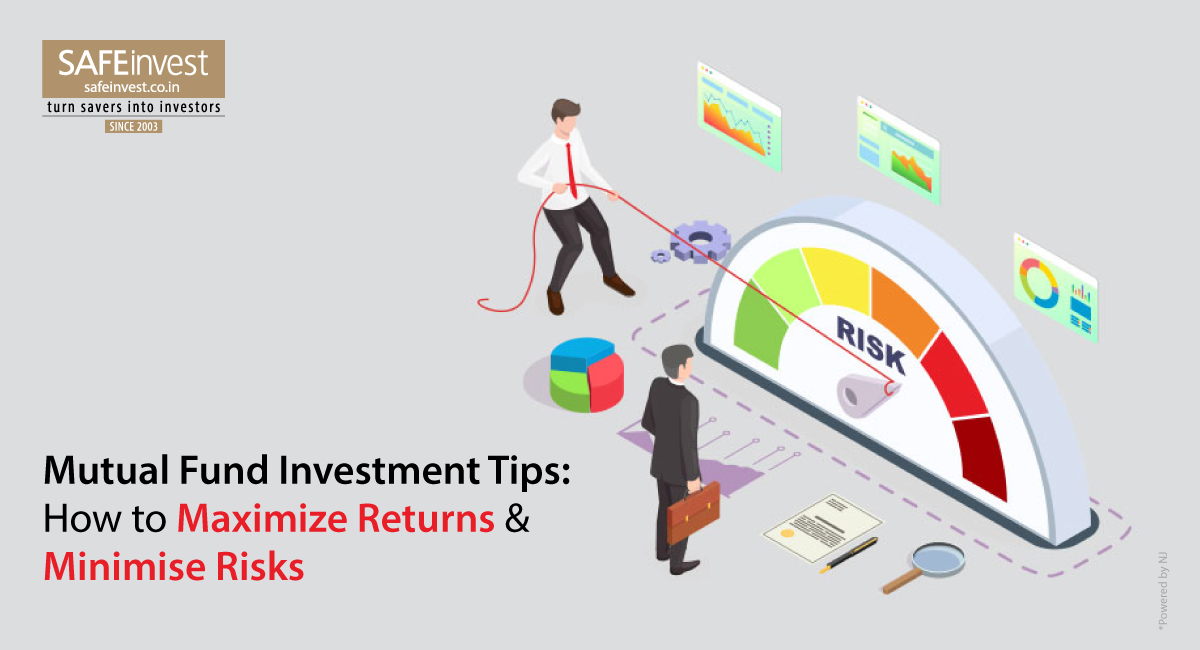Mutual Fund Investment Tips: How to Maximize Returns & Minimise Risks

Investing in mutual funds has become one of the most popular ways to build wealth while balancing risk and reward. For both beginners and seasoned investors, understanding the right approach can make a significant difference in returns. While mutual funds are managed by professionals, your role as an investor is equally important in making informed choices and being disciplined.
Let’s explore essential Mutual Fund Investment Tips to help you maximise returns and minimise risks effectively.
1. DEFINE YOUR FINANCIAL OBJECTIVES CLEARLY
The first and most important investment tip in mutual funds is to start with defining your financial objectives. Ask yourself:
- Are you investing for retirement, buying a house, or your child’s education?
- Do you want to build long-term wealth or short-term liquidity?
Objectives determine the type of mutual fund you should select. For example, equity funds are ideal for long-term growth, while debt funds may suit short-term needs. Having clarity avoids impulsive decisions and helps you stick to your plan even when the market fluctuates.
2. UNDERSTANDING YOUR RISK APPETITE
Risk tolerance varies from person to person. Some investors are comfortable with volatility, while others prefer stability. Assess your comfort level before choosing a fund category.
- High Risk: Equity Mutual Funds
- Moderate Risk: Hybrid or balanced funds
- Low Risk: Debt Mutual Funds
Matching your investment with your risk profile ensures peace of mind and prevents panic selling during market downturns. This is one of the golden mutual fund investment tricks to safeguard your portfolio.
3. DIVERSIFY, BUT DON’T OVER-DIVERSIFY
Diversification spreads risk across asset classes. A well-diversified asset allocation ensures that if one asset underperforms, another can balance it. For instance, holding equity, debt, and hybrid funds together reduces concentration risk.
However, too much diversification can dilute returns. Instead of owning 15-20 funds, stick to 5-10 funds across categories. This balance helps you manage risk without compromising on potential growth.
4. CHOOSE THE RIGHT FUND CATEGORY
Not all mutual funds serve the same purpose. Choosing the right category is among the most practical mutual fund investment tips:
- Equity Funds: Best for long-term wealth building.
- Debt Funds: Safer option for regular income and capital preservation.
- Hybrid Funds: Combine equity and debt for balanced growth.
- Index Funds: Track market indices, ideal for passive investors.
- ELSS Funds: Provide tax-saving benefits under Section 80C with a 3-year lock-in.
Selecting funds aligned with your financial objectives and risk profile ensures better outcomes.
5. START EARLY AND STAY INVESTED
One of the most effective mutual fund investment tricks is to start early. Compounding works best when you give your money time to grow. Small investments made consistently can build significant wealth over decades.
6. INVEST THROUGH SIPs
Systematic Investment Plans (SIPs) are one of the most recommended investment tips in mutual funds. SIPs allow you to invest a fixed amount regularly, irrespective of market conditions. They bring discipline, eliminate the need for timing the market, and average out purchase costs over time.
In volatile markets, SIPs help you buy more units when prices are low and fewer when prices are high, ensuring long-term cost efficiency.
7. KEEP A LONG-TERM HORIZON
Mutual funds, especially equity-oriented ones, reward patience. Short-term volatility can often lead to losses, but staying invested over the long run reduces risk and enhances returns.
Historically, equity mutual funds have delivered strong returns when held for 7-10 years or more. Avoid frequent buying and selling, as it only adds unnecessary costs and disrupts compounding.
8. REVIEW AND REBALANCE PERIODICALLY
Markets are dynamic, and your asset allocation should evolve with time. Reviewing your investments every 6-12 months is a crucial step. If your equity allocation has grown beyond your comfort zone due to the market rally, rebalance by shifting some money to debt funds. Similarly, if a fund consistently underperforms its benchmark for more than 2-3 years, consider replacing it. Regular reviews help you stay aligned with objectives and manage risks effectively.
9. AVOID EMOTIONAL INVESTING
Emotions are one of the biggest enemies in your financial journey. Many investors panic during market corrections and exit their funds, locking in losses. Similarly, during rallies, they chase high-performing funds without analysing fundamentals.
Mutual fund investment highlights discipline over emotions. Stick to your strategy, avoid herd mentality, and trust the power of long-term investing.
10. TAX-EFFICIENCY MATTERS
Tax implications play a role in overall returns. For instance:
- Equity Fund gains held for more than 1 year are taxed at 12.5%.
- Debt fund gains held for less than 3 years are taxed as per your slab.
Choosing funds wisely, like ELSS for tax savings or holding investments for the long term, can optimise post-tax returns. Always include tax planning in your mutual fund investment tips checklist.
FINAL THOUGHTS
Mutual funds are one of the best investment vehicles for building wealth, but success depends on following the right approach. Defining financial needs, understanding risks, diversifying smartly, and staying disciplined are the pillars of successful investing.
The most effective Mutual Fund Investment Tips boil down to three things: start early, stay invested, and review regularly. Combine these with professional guidance, and you will be well on your way to maximising returns and minimising risks.
Remember, investing is not about chasing quick profits; it’s about building long-term financial security.
Mutual fund investments are subject to market risk, Read all scheme related documents carefully.
